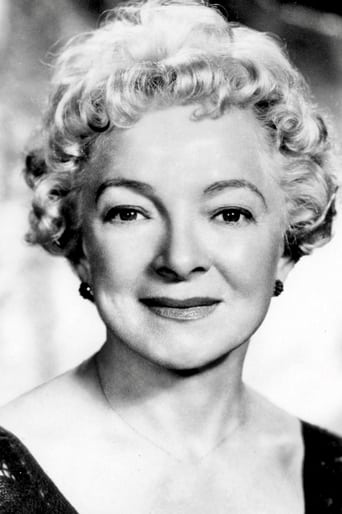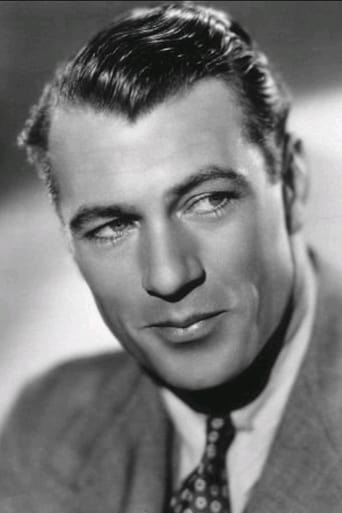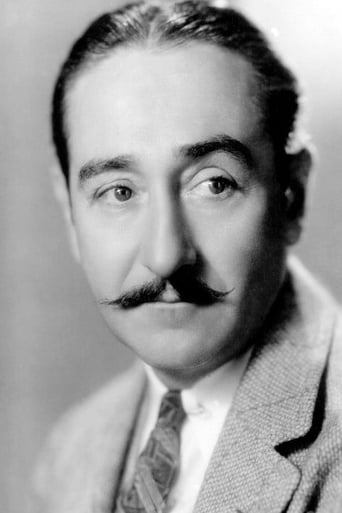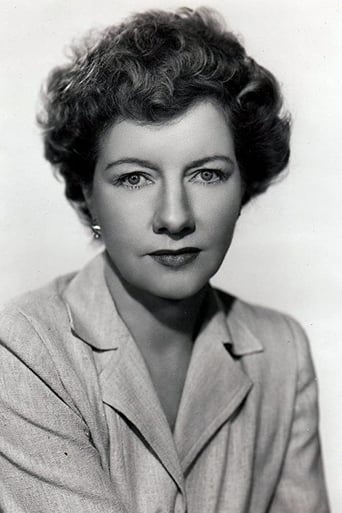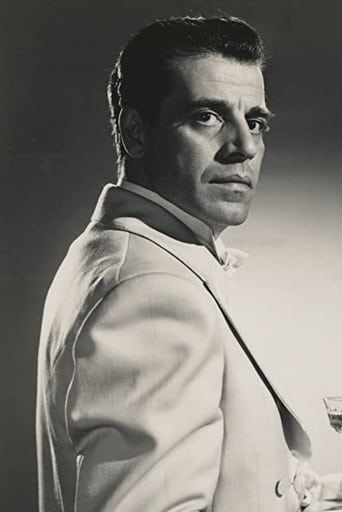AniInterview
Sorry, this movie sucks
Sameer Callahan
It really made me laugh, but for some moments I was tearing up because I could relate so much.
Josephina
Great story, amazing characters, superb action, enthralling cinematography. Yes, this is something I am glad I spent money on.
JohnnyLee1
Hayes and Cooper are splendid and film is best when they are alone on screen. Their scenes are romantic and even daring. When Hayes questions Cooper about his past "lovers" it is done with wit and maturity.
SPOILER ALERT Unfortunately we know that Catherine's "sin" cannot go unpunished. Everyone seems to conspire against the lovers. And Catherine's character is too passive to be an admirable heroine. The whole movie is very well set up from the beginning but the ending is too long delayed for modern audiences. Why isn't Frederick allowed to visit his dying "wife"? And Wagner playing as Catherine dies is way over the top!
zetes
I can't speak to this film's worth as an adaptation of the Hemingway novel, as I've never read it, but it's an excellent film. Borzage lost little of his talent when he moved to sound. This is a rare film from the era where the camera moves almost constantly, and there are many clever filmmaking conceits throughout (most notably the long POV sequence after Gary Cooper is first paralyzed). Cooper stars as an American fighting for Italy in WWI. He falls for nurse Helen Hayes, though they are not allowed to marry. That can't keep them apart, though, and when he goes back to fight she goes off to Switzerland - secretly pregnant. The two have vowed to write each other, but a conspiracy keeps their correspondences from reaching each other. This is pure melodrama, and by the end it turns into an unabashed weepy, but it's beautiful throughout, quite romantic and downright sexy at times. Both Cooper and Hayes are fantastic. Adolph Menjou as Cooper's best friend and Mary Philips as Hayes' do well in the major supporting roles.
Larry41OnEbay-2
Some interesting facts in a story loosely based on Hemingway's experiences, but he didn't like it. 1) Semi-autobiographical novel by Ernest Hemingway, published 1929, still in print. 2) The title is from a 16th century poem by George Peele. 3) Hemingway was an American ambulance driver for Italian army during WWI.4) Hemingway, known for being ornery cuss had little use for people in the film industry. But he did like Cooper and they became close friends for the rest of their lives.5) The studio shot two different endings so theater owners could pick which their audience would like best. Hemingway hated that but liked the $24k for the rights.6) Helen Hayes, although happily married at the time had a crush on Cooper admitting in her autobiography… 'like half the women in the world, I was, in the words of the Noel Coward song, "Mad about the boy."'7) Helen Hayes, First Lady of the American Theater, was born in year 1900 in Washington D.C. a) On stage at age 5; Broadway at 9 and by age 18, she was a star. b) In 1928 she married playwright Charles MacArthur, they moved to Hollywood and she won her first Oscar for THE SIN OF MADELON CLAUDET (1931). c) She won a Tony Award the first year they were presented, in 1947, for HAPPY BIRTHDAY. d) She won Televisions Emmy award in 1952 & 1958. e) She returned to films as the Dowager Empress in ANASTASIA (1956) and won another Oscar for her role in AIRPORT (1970). f) Her son is actor James MacArthur (of HAWAII FIVE-O fame). 9) Gary Cooper born on the Montana ranch of his wealthy father, and educated in a prestigious school in England — Cooper was a rugged frontiersman with the poise of a cultured gentleman. a) Because he failed at political cartooning he sought work as a cowboy extra in movies. b) While making THE WINNING OF BARBARA WORTH movie star Clara Bow also took an interest in Cooper seeing that he was in more of her films. c) Silent films taught him how to act. d) Cooper's first talkie success was THE VIRGINIAN (1929), in which he developed the taciturn, laconic speech patterns that became fodder for every impressionist on radio, nightclubs, and television. e) Cooper alternated between tie-and-tails parts in DESIGN FOR LIVING (1933) and he-man adventurer roles in THE LIVES OF A BENGAL LANCER (1935) for most of the 1930s. f) In 1941, he was honored with an Oscar for SERGEANT YORK, and was nominated for, PRIDE OF THE YANKEES. g) Even those co-workers who thought that Cooper wasn't exerting himself at all when filming were amazed to see how, in the final product, Cooper was actually out-acting everyone else, albeit in a subtle, unobtrusive manner. h) Some of my favorite Cooper films: MR. DEEDS GOES TO TOWN, MEET JOHN DOE, BALL OF FIRE, FOUNTAINHEAD. i) In the 1950s he made mostly westerns like HIGH NOON, Cooper retained his box-office stature. Privately, however, he was plagued by illnesses finally dying of lung cancer in 1961. 10) Adolph Menjou, who plays Cooper's drinking buddy and an Army surgeon actually served as a captain in the Ambulance Corps for 3 years during WWI. a) Made more than 100 films moving from silent film leading man to talkies and later supporting roles. b) Menjou was Oscar nominated for THE FRONT PAGE the year before tonight's film in 1931. He played the newspaper editor later played by Cary Grant in the remake HIS GIRL Friday. c) In the 1950's Menjou was a "friendly witness" before the HUAC commission. d) His last notable film was the classic anti-war picture PATHS OF GLORY (1957) playing the villainous WWI General for director Stanley Kubrick.11) Director Frank Borzage was one of the early major directors of Hollywood and like his contemporaries JOHN FORD, HOWARD HAWKS & KING VIDOR they all made the transition from silents to talkies but only Borzage won an Oscar as a director in both eras. His Academy Award for Best Director was for his earlier romantic WWI film, SEVENTH HEAVEN.Remade with Rock Hudson and Jennifer Jones, A Farewell to Arms (1957) and as a TV miniseries with George Hamilton and Vanessa Redgrave, "A Farewell to Arms" (1966).In reality, she (the nurse) dumped Hemingway as he was 5 years younger (too young in her eyes) and she went back to the older Italian man!!! Hemingway was so hurt that when he wrote the novel he killed her off.
TomSunhaus
This film has, at the beginning several instances of behavior that many films utilize that make me wonder if the behavior was intended by the author, director, or actor. A natural plot point was exhibited when the ambulances were going uphill & someone in back pleaded for the truck to stop because a wounded soldier was 'bleeding to death'. The ambulance could not stop because it was on a grade and stopping was impossible. This would show the cruelty of war. However, when the ambulance reaches the hospital the lieutenant in charge of the ambulance flirts with nurses before arranging for off-loading patients at the hospital. Gary Cooper, as Lieutenant Henry, does his cute-character bit while wounded soldiers are dying in the ambulances.Did the author intend for the lieutenant to behave with such cruelty? The lieutenant will later desert out of love for his wife. Maybe his whole manner is of a self-involved dandy. But the author has characters mentioning the cruelty of war all the time. But if these people are cruel also, how can they complain.The character doctor Rinaldi says something along the lines that Christians should not mind being killed, presumably because they go on to their 'reward' of heaven. Did the author write this? Did the author intend the flippant way that the doctor says it? The director shoots a shot of an uncaring lieutenant immediately after the ambulance attendant complains that a soldier is bleeding to death. Was this the intention of the author, the director (or editor) making a statement of their own. Maybe this was a decision by Gary Cooper.The nurse and lieutenant may complain about the cruelty of war, but their whole affair was the result of them volunteering to be there. Then they proceed to abandon there posts repeatedly.To me any case to be made for the importance of humanity is undermined by everybody in the 'play' lacking it. The doctor friend of Henry keeps calling Henry his baby & then proceeds to destroy his life by pushing him to alcoholism. Each character seems to say 'I'm human and it is important to be human' & then proceeds to do something cruel. Presumably, the war only ended because of exhaustion and not because of intelligent human thought.I guess what confuses me is the way the characters (or actors) work very hard, which tends to make me sympathetic to them, but when their behavior is cruel a dissonance is created.

